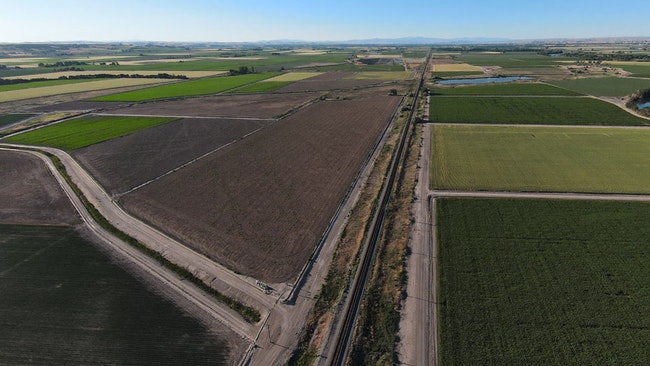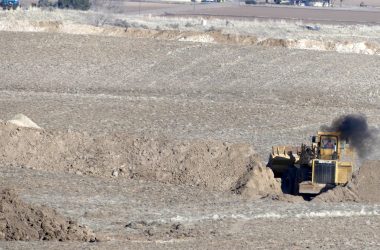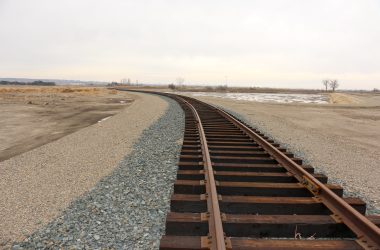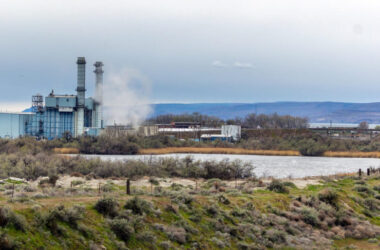
The site of the Treasure Valley Reload Center is still farmland but construction on the project is expected to start in September. An extra $3 million was granted to the rail reload center project by state lawmakers last month. (AUSTIN JOHNSON/The Enterprise)
NYSSA – Another $3 million in public money is going into the Treasure Valley Reload Center and neighboring industrial park, last-minute funding for a “critical” water line.
The money was set aside in the closing days of the Oregon Legislature, requested by Greg Smith’s economic development team in Malheur County and then assigned to a legislative budget committee where Smith holds sway.
Getting a water line from Nyssa city limits to the rail shipping center planned for north of the city is considered key to opening up about 200 acres for industrial development.
READ IT: Water line funding request
Malheur County’s development team still hasn’t found a way to pay for industrial sewer service to match the water line installation.
The public money for the 2.5-mile water line comes on top of $26 million set aside in 2017 for the Nyssa project, meaning taxpayers will have put up nearly $30 million for a project designed to ease shipping and boost profits for the area’s onion industry.
Malheur County, meantime, is absorbing estimated costs of more than $22,000 month to support the project.
It’s unclear how the $3 million gift came about and in what way Smith used his two roles – as the paid county economic development director and as a state legislator – to engineer the deal that surprised local and county officials. Smith didn’t return telephone messages or respond to emailed questions.
However it happened, the money covers a cost overrun for the reload project.
The money to extend the water line beyond Nyssa to the shipping center originally was in the budget the county issued in September 2018. Smith’s team included the $1.3 million needed for the water line in its overall plan for spending $26 million on the Treasure Valley Reload Center.
At that time, the budget was already tight, and Smith’s team couldn’t pay for everything it wanted for the shipping center. While the water line stayed in, the team cut spending on extending sewer service and on improving roads to handle the new truck traffic.
But by early 2020, the water line fell victim to shifting costs.
The board of the Malheur County Development Corp., the company set up by county commissioners to run the project, heard from Smith in January that it would be cheaper for the county to resort to a well for water for the shipping center.
Smith told the directors at that time, “Our initial plan was to run water and sewer from the city to the site but as we started looking at the best use of dollars, we realized we had adequate water rights, and for the fraction of the cost we could handle our own wastewater, and for a fraction of the cost, we could manage our own fire suppression system.”
The project’s lead engineer also emphasized the need to cut costs in addressing the utilities during a board meeting in May 2020.
“We made the decision to generate water on-site and dispose of sewer on-site. This is very helpful for the overall project budget,” said Brad Baird, president of Anderson Perry & Associates. “There was a $5 million expense to extend from Nyssa to the facility and it was unclear how much would be covered by ODOT. The county is not in a position to go into any more debt.”
A revised project budget from the time no longer included money for the water line.
At about that time, Smith chased after $5 million in federal money to cover not only the water line but to add a sewer extension.
His pitch to the federal government in 2020 said that “it will be imperative to provide full water and sewer service to the site to accommodate additional site development and to provide needed fire flow capabilities.”
Federal officials turned him down.
Smith’s team pressed ahead to launch construction of the shipping center without getting that “imperative” service. The most recent budget, prepared last February, still didn’t allocate money to extend the water line. Last month, the water line became an urgent need, according to state documents. For the money, the development team turned the Legislature, where it had a well-placed supporter – Smith himself.
The county pays Gregory Smith and Company $9,000 a month to operate the Malheur County Economic Development Department. Smith performs as the department’s director. The county pays an additional $6,000 a month for the Smith company’s work on the shipping center. One task in his contract: “Ensure progress is being made to secure funding.”
At the same time, he serves as a state representative in the Oregon House, though his legislative district headquartered in Heppner doesn’t include Malheur County.
Smith carries considerable clout at the Capitol, in part because of his long service. But he holds key positions on committees that decide how state money will get spent – and which requests from outside government will get favorable treatment. He is co-vice chair of the Joint Ways and Means Committee.
He also holds a seat on its Capital Construction subcommittee.
Legislators were on the final path to adjournment when Smith’s team sent in its request for $3 million. The request from the development company was made on June 9, according to state records, and listed Greg Smith as the contact.
The team left the impression there was little time to lose to get the money in place for the Nyssa project.
“It is critical a municipal water system is extended to this area as soon as possible,” the development company’s submission said. “Municipal water service and fire protection for site safety is imperative to properly serve the industrial lands.”
What made the need “critical” wasn’t clear and Smith didn’t disclose much publicly about the matter as it worked its way through the legislature.
Smith didn’t tell of the “imperative” need for funding when directors of the Malheur County Development Corp., met just one day before Smith’s team put in for the money. The subject didn’t come up either at the board’s emergency meeting of June 16.
Baird said the water line wasn’t needed to start construction on the rail center, now scheduled for September.
“Utilities from Nyssa to the site are needed to develop the area beyond just the reload facility,” said Baird.
Adele Schaffeld, Malheur County building inspector, said she was unsure whether the hook up to the Nyssa water system will provide enough fire protection for the rail center.
“I didn’t see any plans on size or anything so I don’t know,” said Schaffeld.
Whatever the urgency, Smith was in a powerful position in Salem to see that the Nyssa project got the money.
On June 19, the budget subcommittee on which Smith sits considered a massive laundry list of state spending. The committee on June 24 approved House Bill 5006 that included the $3 million for the Nyssa project. Two days later, the House and Senate both passed the legislation and, with just one day left in the session, the development company managed by Smith had its money. Yet Smith said nothing publicly about millions more coming.
His “weekly update” email he sends out each Friday as the economic development director typically chronicles progress on the shipping center. But his update of June 16 – more than a week after his team put in for the money – made no mention of a new attempt to add millions to the shipping center. And his update a week later on June 25 didn’t mention his legislative subcommittee’s approval of a spending bill that apparently included the Nyssa money.
And on June 22, Smith put out a press release in his county role trumpeting progress on the shipping center.
“The Treasure Valley Reload Center is moving closer to construction,” the release said.
He made no mention the project was poised to get its “critical” water line.
Jim Maret, Nyssa city manager, said he didn’t know anything about the money until interviewed about it in late June by the Enterprise.
“If I had a set of plans in front of me, I could tell you more,” said Maret.
Malheur County Judge Dan Joyce said he knew “there was a plan that hopefully we could get something” but wasn’t aware the money had been awarded until contacted by the Enterprise.
State Sen. Lynn Findley, R-Vale, said he was aware of the funding.
“(State Rep.) Mark Owens and I, we talked about a list of projects from the first of May on,” said Findley.
Findley holds a seat on the development corporation board.
News tip? Contact reporter Pat Caldwell at [email protected] or 541-473-3377.
RELATED COVERAGE:
Malheur County faces need to borrow $2 million to make rail project run
Malheur County leaders mum as appraisal shows land value $1 million less than they agreed to pay
Malheur County board to farm operation: You will stay silent
SAFEGUARD YOUR LOCAL NEWS
Take one action today to help the Enterprise grow and do more for the community through accurate, fair reporting.
SUBSCRIBE: A monthly digital subscription is $5 a month.
GIFT: Give someone you know a subscription.
ONE-TIME PAYMENT: Contribute, knowing your support goes towards more local journalism you can trust.




